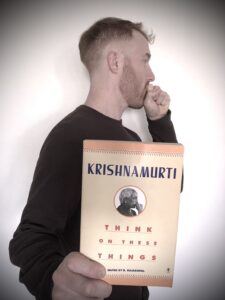 This book is a collection of talks given by the author Krishnamurti to groups of school children, parents, and teachers. He talks about a variety of ideas like education, freedom, and truth, and also answers questions asked by the students.
This book is a collection of talks given by the author Krishnamurti to groups of school children, parents, and teachers. He talks about a variety of ideas like education, freedom, and truth, and also answers questions asked by the students.
One of the most important questions that he considers throughout the book is: What is the purpose of education? If we are simply learning something so that we can pass an examination, is that really education? Krishnamurti argues no. “Not to imitate but to discover—that is education,” he believes. “When learning is only a means to get somewhere, the moment you have got where you want to go, you forget the means—and surely that is not learning at all. So there may be the state of learning only when there is no motive, no incentive, when you do the thing for the love of itself.” With this sentiment in mind, we must ask ourselves: Is school a place where children go to learn or one where they are indoctrinated?
This line of thought leads him to examine the role of tradition in society. We are all made to conform to social norms, and it is important to determine for ourselves when this is good and when it is detrimental. The weight of the past drives us to conform, and “through conformity the mind feels safe, secure; it establishes itself in a well-oiled groove so that it can run smoothly without disturbance, without a quiver of doubt.” Yet it is imperative for us to embrace doubt, for how else are we to learn? Certainty kills our impetus to search for new meaning—it is only when we think ‘I don’t know’ that we are able to search for truth.
This leads us to the question of religion, for what is religion but the passing on of traditions from one generation to the next. Krishnamurti believes that “if a man is seeking God he shuns temples because they divide people. The Christian church, the Mohammedan mosque, your own Hindu temple—they all divide people, and a man who is seeking God will have none of these things.” Perhaps religion, like education, is simply another avenue for indoctrination of the youth?
Our author also comments on power and freedom when he comments that “the moment you want to be somebody you are no longer free.” Anything we may aspire to be creates constraints on our behavior, whether we covet a job, a relationship, or a virtue. Only when we are “not moved by the desire to be somebody” are we truly free. While this may be true, don’t we need desire to get us out of bed in the morning? Without aspiration, why do anything in life? More thoughts for us to consider.
One of the most important themes in this book is the search for truth, and it is impressed upon his audiences (and readers) that truth is not something that can be given to us by others: we must find it for ourselves. It is a journey we must all embrace, for it is synonymous with the journey of life.
Think on These Things is a book overflowing with philosophy, some of which I found to be deeply insightful, and some of which I questioned. But of course, that is the purpose of philosophy: to make us think.


Leave a Reply